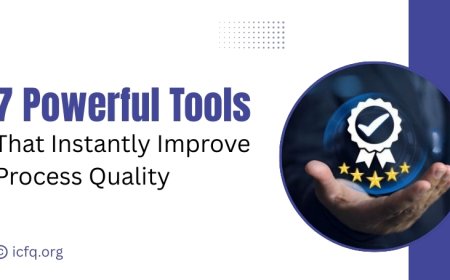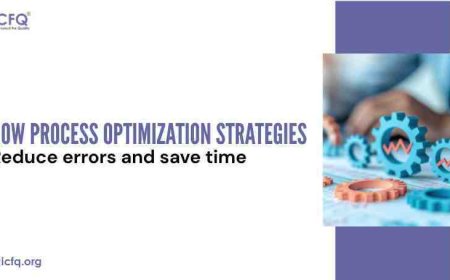what are the benefits of Six Sigma Certification
Understanding the benefits of Six Sigma Certification. Enhance efficiency, and problem-solving skills, and advance your career with this valuable certification. Learn more today

Six Sigma Certification has become a needed credential in the business world, known for its wide approach to improving quality and efficiency. But what exactly makes Six Sigma certification so valuable? This certification provides professionals with the tools and methodologies to identify and eliminate defects, streamline processes, and drive significant improvements within organizations. Whether you're aiming to advance your career, enhance your skills, or contribute to operational excellence, understanding the benefits of Six Sigma certification can help you make an informed decision.
What is Six Sigma
Six Sigma is a data-driven methodology aimed at improving the quality of processes by identifying and eliminating defects and variations. Developed by Motorola in the 1980s, Six Sigma focuses on reducing errors and enhancing efficiency through statistical analysis and systematic problem-solving techniques. The term Six Sigma refers to a statistical measure where the goal is to achieve fewer than 3.4 defects per million opportunities, indicating near-perfect performance.
The Six Sigma framework involves several key concepts:
1.DMAIC Methodology: This stands for Define, Measure, Analyze, Improve, and Control. It is used to improve existing processes.
2.DMADV Methodology: This stands for Define, Measure, Analyze, Design, and Verify. It is used to create new processes or products.
3.Belt Levels: Six Sigma certifications are categorized into different belt levels, such as Yellow Belt, Green Belt, Black Belt, and Master Black Belt, each representing different levels of expertise and responsibility.
4.Statistical Tools: Six Sigma employs various statistical tools and techniques to measure and improve process performance.
By focusing on data-driven decisions and continuous improvement, Six Sigma aims to achieve operational excellence and maximize customer satisfaction.
Enhanced Career Opportunities

1. Increased Job Marketability: Six Sigma certification sets you apart in the job market by showcasing your expertise in process improvement and quality management. This certification makes you a more attractive candidate to employers looking for skilled professionals who can drive operational excellence.
2. Higher Earning Potential: Certified Six Sigma professionals often command higher salaries due to their specialized skills and ability to deliver significant cost savings and process improvements. The certification can open doors to higher-paying roles and career advancement opportunities.
3.Recognition as a Qualified Professional: Earning a Six Sigma certification validates your proficiency in using Six Sigma methodologies and tools. This recognition enhances your professional reputation and establishes you as a credible expert in process improvement and quality management.
Cost Savings
1.Reduction in Operational Costs: Six Sigma certification equips professionals with tools to identify inefficiencies and reduce waste. By streamlining processes, organizations can significantly lower operational costs, minimizing errors and improving productivity.
2.More Effective Resource Management: Certified professionals are trained to optimize resource allocation. This leads to better management of time, materials, and labor, ensuring that resources are used efficiently without unnecessary expenses.
3.Improved Profitability Through Process Optimization: Six Sigma focuses on continuous process improvements, which directly impact an organization’s bottom line. By refining processes and reducing defects, companies can increase profitability and achieve sustained financial growth.
Better Problem-Solving Skills
1.Advanced Problem-Solving Techniques: Six Sigma certification provides professionals with structured methodologies like DMAIC and DMADV, enabling them to tackle complex business problems more effectively. These techniques help in identifying root causes and implementing long-lasting solutions.
2.Data-Driven Decision Making: Six Sigma emphasizes the use of data for decision making, ensuring that business decisions are based on facts and analytics rather than assumptions. This leads to more accurate and reliable outcomes in process improvements.
3.Enhanced Analytical Skills: Six Sigma certification sharpens your analytical abilities, empowering you to break down complex data sets, identify trends, and make informed recommendations that contribute to organizational success.
Increased Employee Satisfaction
Reation of a Positive Work Environment: Six Sigma fosters a culture of continuous improvement, leading to streamlined processes and reduced frustration. A more efficient workplace reduces stress and promotes job satisfaction among employees.
Empowerment Through Training and Development: Six Sigma certification provides employees with the skills to identify problems and improve processes. This empowerment boosts confidence, engagement, and a sense of ownership over their work, enhancing overall job satisfaction.
Enhanced Team Collaboration and Morale: Six Sigma encourages teamwork and collaboration as employees work together to solve problems and optimize processes. This fosters a stronger sense of camaraderie, improving morale and cohesion within the organization.
Six Sigma certification offers plenty of benefits that can significantly impact both your personal and professional growth. Key advantages include enhanced career opportunities, with increased job marketability and earning capacity, along with improved problem-solving skills and resource management. The certification also leads to cost savings for organizations, better employee satisfaction, and recognition as a qualified professional.
Pursuing Six Sigma certification, especially through programs accredited by institutions like ICFQ (International Council for Quality), can provide you with the expertise needed to excel in quality management and process optimization. Take the step toward certification and unlock new career possibilities.




























